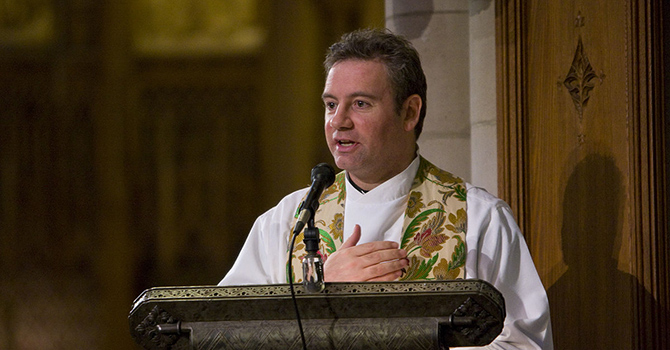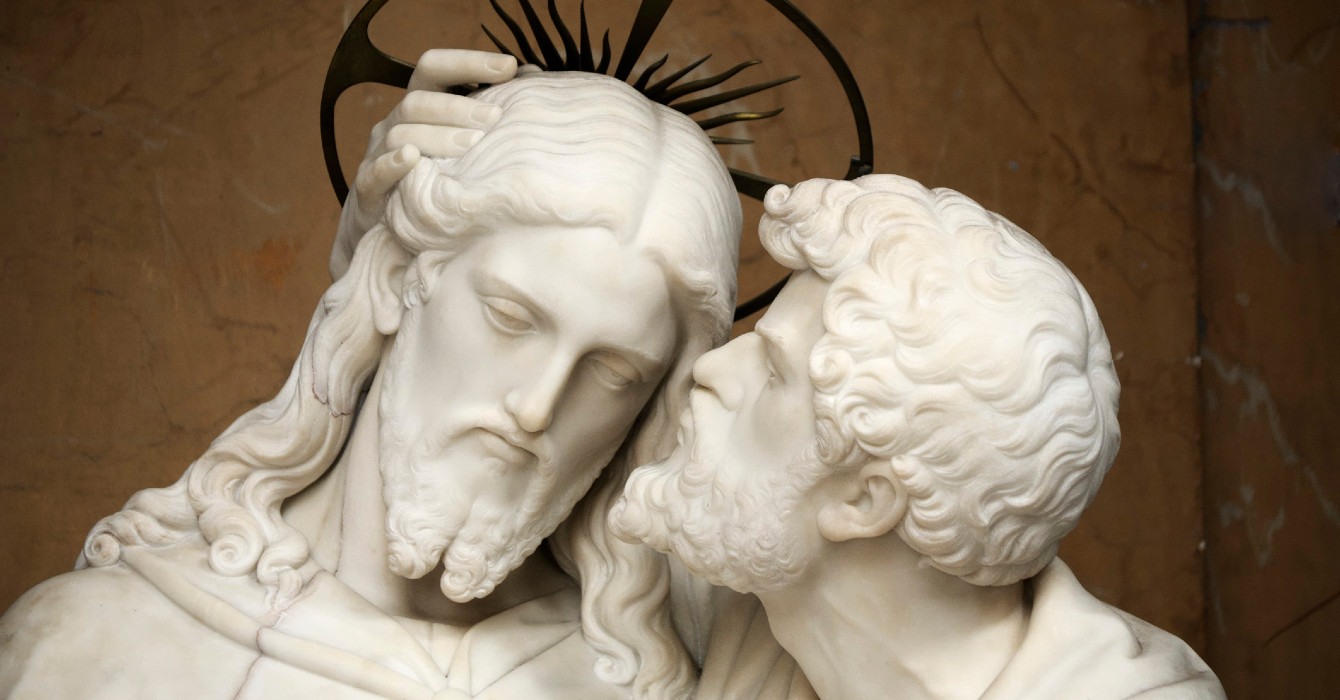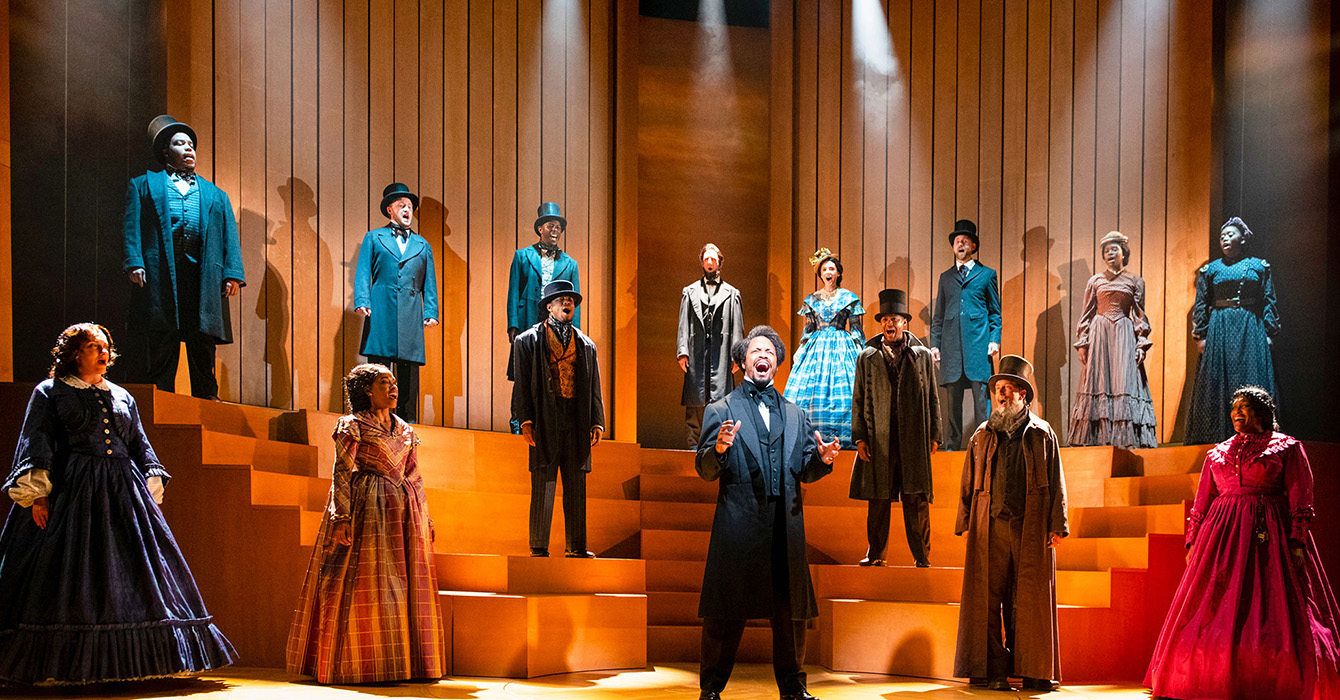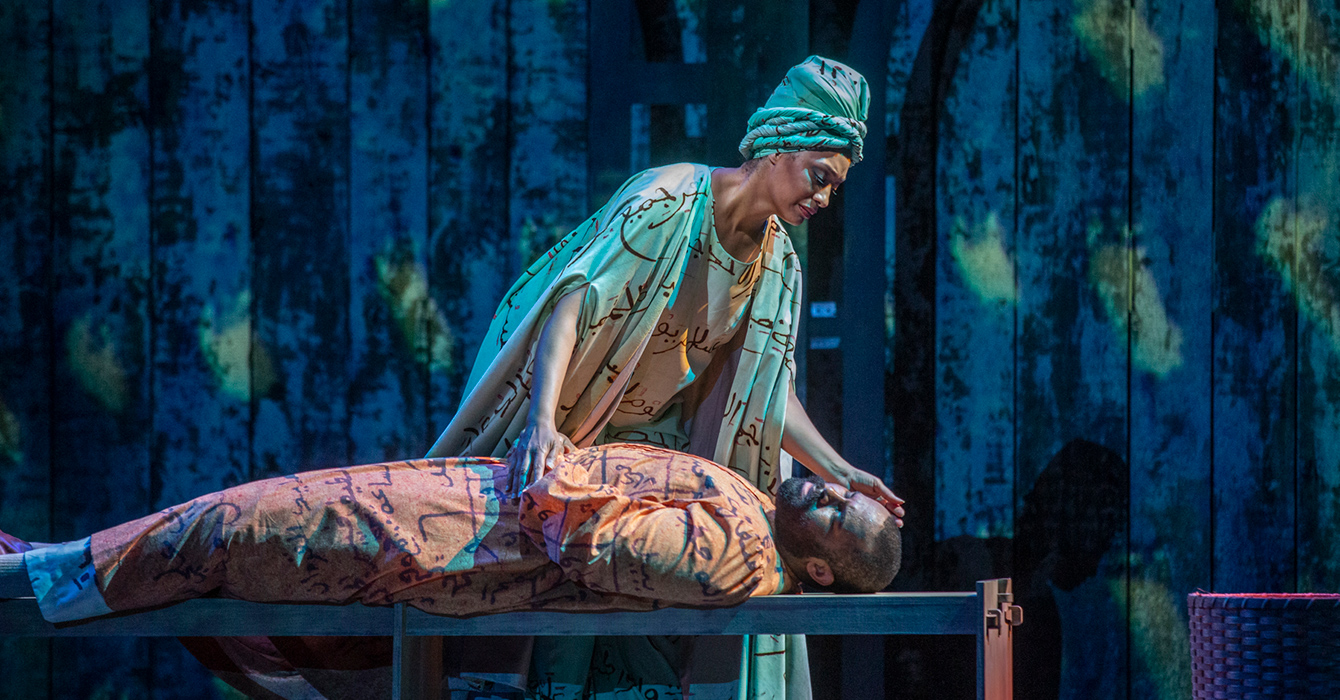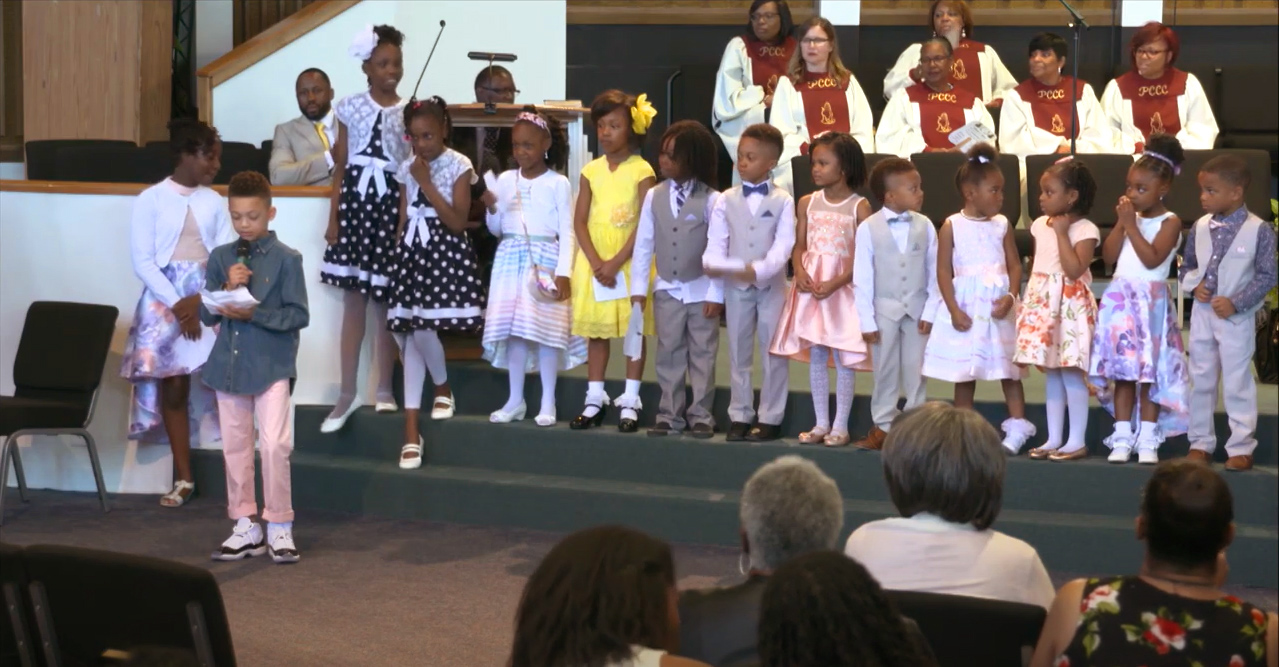Updated: The Rev. Dr. Samuel Wells, former dean of Duke University Chapel, is vicar of St Martin-in-the-Fields, London.
Contrary to popular perception, improvisation is not about being original, clever, witty or spontaneous but about being so steeped in a tradition that you learn to take the right things for granted, said the Rev. Dr. Samuel Wells.
Theatrical improvisation, then, offers important lessons for the church and for institutional leaders, said Wells, author of “Improvisation: The Drama of Christian Ethics.”
“Leadership is mostly improvisation,” Wells said. “The mistake is to think that improvisation all happens in your own head.”
Instead, leadership is about forming a state of trust in a community where people can learn to do things they haven’t done before.
“A leader can’t close the office door and dream up this brilliant idea,” he said. “The leader has to listen to what’s going on in the organization and take energy from there and bring energy in response.”
Wells, an Anglican minister and scholar, has served as dean of Duke University Chapel and research professor of Christian ethics at Duke Divinity School since 2005. He announced in December that he will return to England in summer 2012 to become the vicar of St. Martin-in-the-Fields in London.
A prolific author and editor, Wells spoke with Faith & Leadership recently about “Improvisation,” one of his 17 books. The video clip is an excerpt from the following edited transcript.
Q: Give us an overview of “Improvisation: The Drama of Christian Ethics.”
There has been a lot of theological discourse in the last 30 years about words like “narrative,” “drama” and “performance.” The book contends that “improvisation” is a better word for how we deal with tradition.
It recognizes that we face new circumstances in each generation that the Bible doesn’t give us a script for. It’s wrong to say [Christians] “perform” a script, as if we can do that over and over again. “Performance” suggests a woodenness, a repetitiveness and a lack of dynamism that isn’t true to the church’s experience.
The Christian story is a five-act play -- creation, Israel, Jesus, church and eschaton. We find ourselves in Act 4, and the most important events have already happened. Our role is to be faithful in Act 4, because God will do the rest in Act 5.
All of that is a discourse within academic theology. But there’s also a pastoral dimension to the book that arises out of my own experiences in parish ministry. The most dynamic gift to the church is the Holy Spirit working amongst people who learn to trust one another and see the abundant things that God can do with limited materials. That’s analogous to what happens in theatrical improvisation.
Q: How so?
It’s probably best to start with some of the misunderstandings that people have. Improvisation isn’t about being original, clever, witty or spontaneous.
Improvisation is about allowing yourself to be obvious. It’s about being so soaked in a tradition that you learn to take the right things for granted. People who train in improvisation train in a tradition. They learn to trust one another and to say the obvious thing.
There are two important moments in improvisation -- the moment of formation and then the moment of decision.
For example, take Chesley Sullenberger, the pilot who landed in the Hudson River when his plane was hit by a flock of geese. He is the classic improviser. Here he is, he’s just taken off from New York with 150 people on board, and his engines go out.
What does he do? Well, that’s not the moment to look for an extraordinary gift of skill. All he can do is fall back on what he’s practiced hundreds of times in his training.
So he improvises. He’s never been in the air above New York and had his engines go out before. He’s in a new situation where he has to fall back on the formation that’s taken place over decades. So he looks around, he sees the Hudson River, and he thinks, “I can dip down in there. I might hit something, but it’s less of a problem than landing in the middle of Manhattan. I’m going to give it a try.”
It’s a classic moment of improvisation. He’s not being spontaneous, clever or witty, but he’s bringing into the moment all of that shaping over a long period of time. That’s the kind of thing I’m talking about, and that’s what churches do when they face ghastly situations.
When a half-dozen Amish schoolchildren were killed a few years ago, the Amish had to improvise. They had talked about forgiveness for their entire history, but they’d never imagined that a half-dozen of their children would be wiped out in an afternoon.
They had to improvise. They had to fall back on that deep training, and they found that they had the opportunity to forgive.
So there are those two crucial moments -- formation and decision. What you can’t do is, in the moment of decision, create a tradition. You can’t do that. You can only reflect the tradition that you’ve been created in.
I begin the main section of the book with a famous quotation from the Duke of Wellington, that “the battle of Waterloo was won on the playing fields of Eton.” That makes the same point, that it was too late by the time you got to the battle of Waterloo in 1815 to form the character of the leaders of the British Army. That had to be done in the schools of England when they were teenagers.
Q: So improvisation isn’t about “making it up”?
When you’re doing improvisation in the theater, what freezes people is that desire to be clever. Actors have to say the first thing that comes to mind, and part of that is being part of a team. You don’t have to produce everything yourself. You have to recognize the spirit that comes about in a team.
That’s an apt analogy for the Christian life. It doesn’t all have to come from you, and it’s not about getting it right in a predetermined sense -- that you can look back and it says in the book that we did it exactly like that. In any relationship, you’re constantly facing situations you’ve never anticipated. It’s about trust, faithfulness and imagination.
Q: Tell us about the improvisation techniques of acceptance and blocking, and especially overacceptance.
These are terms from the language of theatrical improvisation. When a situation comes along -- say, it’s a burglar coming into your home -- there are three things you can do.
You can accept; you can say, “Come in -- I was just waiting for someone to rob my home. Have a cup of tea! Do you take cream in your coffee?” That’s accepting. You’re changing your whole agenda to adapt to the new circumstance.
Blocking is to get out the revolver and shoot them dead. It refuses to entertain any change to the status quo. I’m exaggerating, but blocking denies the premise of the person that’s coming toward you. It’s just screening them out, more or less.
Blocking is inherently violent. It’s not allowing a space for the other. It usually assumes that you have some way of using power that can block the other. If the Christian community is being faithful, it doesn’t have automatic access to that power. But if it simply accepts, it’s in danger of losing its identity.
But there’s this third notion of overaccepting, where you fit the smaller story that has come your way -- which often you didn’t invite or go looking for -- into the larger story of what God’s doing with the world. This happens on all sorts of levels.
In the mid-1990s, not long before she died, Princess Diana was asked by an interviewer, “Will you ever be queen?” It was a crucial question at the time of the breakup of her marriage.
She paused and then said, “Well, perhaps I’ll be the queen of people’s hearts.”
In a subtle way, what she was doing was saying, “I don’t want that paltry queen of England nonsense. That’s beneath me. I can be queen of people’s hearts.”
That’s overaccepting. It’s a clever move on her part, where she’s saying, “I could cry and say, ‘No, I’ll never be queen, because Charles didn’t love me enough, or I didn’t love him enough.’”
But she’s not going to get bogged down in accepting and blocking. She’s going to put it on a much bigger plane.
We see Jesus making similar moves. We see it fundamentally in the cross and resurrection. Jesus doesn’t block the cross by refusing it. He doesn’t simply accept it and go to his death. Instead, God overaccepts the cross in the resurrection.
That’s what takes place in the whole of salvation history. Look at Jeremiah, the story of the potter. The clay was broken in the potter’s hands and then formed into a new and better pot. That’s really how Christians understand the Old and New Testaments. The pot, the covenant, was broken in God’s hands, but God didn’t throw it away.
That’s what we understand Jesus and the coming of the Holy Spirit and the church to mean. It’s an overaccepting of Israel. It’s not a blocking of Israel and not a simple accepting of the broken covenant, but an overaccepting.
Once you start seeing overaccepting at work, you can see it everywhere. It becomes a whole philosophy of life. It has for me.
Whenever I’m facing a threatening situation, I ask myself, “Why am I attempting to block? Is there a lack of trust? Also, what power do I assume that I can call on that can bring about my desire to block?”
Throughout the centuries, Christian churches have tried to stand in the way of new developments in science, economics, other faiths, or whatever it might be. Many churches are well-known for having an adversarial view, evolution being the most obvious example.
I tend to ask, “How can we overaccept Darwinism?” rather than, “How can we either accept it and say, ‘We’re all Darwinists’ or block it and say, ‘It’s not in Genesis, so we don’t believe it’?”
Q: What are the implications of overaccepting for how Christian institutional leaders think and lead?
One of the mistakes Christian leaders make is that they feel all the energy and the ideas have to come from them. Wherever I’ve been in leadership, something important happens in the first few weeks, and how you respond becomes defining.
When I came to Duke, Hurricane Katrina happened. When I went to my first job in ministry, there was a huge gas explosion, and several members of the congregation ended up in hospital. How you respond speaks everything to your people.
You can’t come in with a blueprint that says, “This is how everything is going to be.” You have to work with the energy that comes to you from the people and from unexpected events.
If you come with a blueprint and something like Hurricane Katrina happens, you can get annoyed and say, “We have important work to do, and these unfortunate incidents are putting us off.”
Well, life is made up of unfortunate incidents. Get over it. Learn to use the energy that comes from unfortunate incidents to define the work that you’re doing.
You can’t allow it to dictate your work, but neither can you try to screen it out. You’ve got to find a way of incorporating it into your story.
Q: Leaders literally have to improvise.
Yeah. Leadership is mostly improvisation. All the things that I describe by improvisation, such as the formation of habits, are what make a good leader. The mistake is to think that improvisation all happens in your own head.
Again, improvisation is not about being clever, original, witty and spontaneous. It’s about forming a state of trust in a community where you can learn to do things you haven’t done before.
A leader can’t close the office door and dream up this brilliant idea. The leader has to listen to what’s going on in the organization and take energy from there and bring energy in response.
Q: At what point does overacceptance become rolling over? Or, from the other direction, is blocking ever acceptable?
Overaccepting is always a balance between blocking and accepting. It’s always a middle course, and it always assumes that you can’t simply accept almost anything without losing your identity, losing all that’s valuable to you.
But blocking usually isn’t an option, and even when it is, it can be for the wrong reasons. Blocking closes down the imagination, just as if I were to disagree with you by punching you in the nose. It’s not the most imaginative way of resolving the issue.
If you think of blocking like that, then it’s about the failure of imagination, the failure of language and the resort to instant solutions to solve problems.
Q: Why is rehearsal so important to improvisation and creativity?
When people say, “Life isn’t a rehearsal,” I say, “But it is, really, isn’t it?” Life is a rehearsal. If we really think heaven is what we say we believe it is, then life actually is a rehearsal for that. So if you think in terms of the five-act play -- creation, Israel, Jesus, church and eschaton -- and of us in Act 4, then Act 4 is really a rehearsal for Act 5. Act 5 is the eternal one. That’s everlasting life.
So, the habits of rehearsal are everything we do in life, and I'm very affected by a lot of stories that encourage me in the belief that most of my life is preparation for crucial moments. I’m not saying I’ve reached a defining moment in my life, but I’ve reached some fairly crucial moments where I had to act from memory.
You’re in a hospital, you’re holding the hand of an 82-year-old woman. All her family are around the intensive care unit, and you know that they’ve just unhooked the machines, so she’s got 45 minutes until she’s going to stop breathing. How do you fill that 45 minutes? That’s what you go to seminary for, to know how to fill that 45 minutes.
I’d say the first thing you do is you sing. You recall something that has been significant in the worshipping life of everybody there, and you sing that, and it puts you in touch with good things about the richness that this woman has brought to everybody’s life. And it’s also a prayer, but it’s a prayer that you know that the woman maybe can still hear, because hearing and touch are really among the last senses to go.
So if you’d never learned that hymn -- in other words, if you hadn’t rehearsed -- how could you ever sing it? So you think, “Well, why do we go -- as you say to teenagers -- why do we go every Sunday and we sing the same boring old hymns?”
Well, there’s an answer for you: because one day you’ll be in hospital with an 82-year-old woman -- and it could be me, actually, that woman -- and you’ll have 45 minutes until she dies, and you’ll be gathered around with everybody, and everyone will be weeping but wanting something important, and you’ll think, “Well, that’s why we sang those hymns, wasn’t it?”
Q: You touched on this earlier, but tell us more about tradition. How does improvisation depend on tradition?
Improvisation can’t work without a tradition. Try improvising without a tradition and you dry up within 30 seconds. Think of humor: what humor almost always does is recover a lost thing from a common experience and reintroduce it in a quirky way.
One notion we haven’t talked about is reincorporation. What reincorporation does is exactly that -- it brings back into the story discarded elements.
The greatest writer on improvisation talks about improvisation being like a person walking backwards. We think about ourselves walking forward into the future, but actually we don’t live like that.
We walk backwards into the future. When we don’t know what to do, we pick up something that we haven’t used. It’s like we go up into the attic and find something we didn’t have a use for before, and then we bring it down and back into our story.
That’s what God does with us. That’s what the Good Shepherd does when he goes and seeks the lost sheep.
That’s how redemption works. That’s how personal salvation works. God finds ways of redeeming even the fact that the brothers sent Joseph down into the pit. “You meant it for evil, but God meant it for good,” as Joseph says. It’s a classic reincorporation story.
That’s what heaven is. Heaven is where we discover that all the discarded people and all the discarded parts of our own story come back into the story in glorious ways.
And that’s what tradition is. Jaroslav Pelikan described tradition as not being the dead faith of the living but the living faith of the dead. Our memories are one of our chief resources in the church. Church history and the Scriptures are a coding of that memory. Every time we preach on a Scripture, we’re bringing back into the present something that’s been neglected in the past.
Q: What does living in Act 4 mean for Christian institutions and their leaders and how they conceive their work?
There are several things you can get wrong. The secular mistake is to believe you’re in a one-act play. In a one-act play, you get to make up all the rules, and it’s totally your responsibility to make sure things come out right by the end.
But it isn’t totally our responsibility to make sure things come out right in the end. Our role is to be faithful, not to be effective. Of course, as John Howard Yoder points out, the difference between faithful and effective is artificial. It’s a difference in time scales.
People who are being faithful believe they are being effective on an eternal time scale. People who believe simply in being effective are saying that it only counts if they can see the results in six months or five years or my life span.
But that’s not a five-act way of thinking. That’s a one-act way of thinking.
We can also make the mistake of just living in Act 2, Israel, thinking the Messiah has not yet come, that we have not yet been given a definitive picture of how God is among us.
But living in Act 4 is to live after Act 3, Jesus. We have a definitive picture of how God is among us.
Also, crucially, the other mistake is to forget that Act 5 is still coming. We don’t have to make things finally come out right. Our job is to recognize that the important things in the story have already happened.
Q: If you don’t have to make it turn out right, then being in Act 4 frees you up in all kinds of ways.
It’s incredibly liberating. We don’t have to be constantly asking questions about our legacy. We leave that in the hands of God. We do what is faithful in our generation.
We can’t know what the future will be. All we can do is try to be faithful in the present, knowing that God will take even our failures and make beautiful things out of those in the future.
Stanley Hauerwas says that perhaps the best that Christians can ever hope to do is to make interesting mistakes. Of all his lines, that’s one of the most dear to me -- that all I can ever hope to do is make interesting mistakes. That’s the language of improvisation.
Q: But isn’t the task of leadership to make it all turn out right?
Again, it’s being faithful and being effective. It’s not about trying to get things so clear by the end of Act 4 that we don’t need Act 5. That’s the mistake of lack of faith. Lack of faith says, “Well, God’s not going to come and help, so we’d better get it all nice and tidy so no one can ruin it.”
I’m coming to the end of my time as dean of Duke Chapel, and the big mistake I don’t want to make is to say, “I’m going to get this so sorted that my successor can’t wreck it.” I’ve seen many institutional leaders try to do that, and it’s a fundamentally unfaithful way to conduct yourself.
All you can do is live in Act 4, act as faithfully as you can, do things that are good for their own sake and not because you think you can stitch up the future, and leave the rest to the Holy Spirit.
Yes, there are things that leaders should worry about. But what I hope I’ve never tried to do is to say that I’m going to fix this so that it’s secure and it’s in the bag. You can never put things in the bag.
Q: Tell us more about the importance of reincorporating the lost. How does that shape the task of Christian institutional leaders?
The key figure in reincorporating is St. Laurence, who was a deacon of the Church of Rome in the third century. The magistrate of Rome demanded that Laurence hand over all the riches of the church. He said, “Give me three days,” and he brought in the poor, the blind and the lame. There they all were, but the magistrate didn’t have a sense of humor. He roasted Laurence on a spit.
I named my first child Laurence, because I believe he is a focal saint for the church. That’s a story that should inspire everybody in Christian ministry. It tells us that God gives us everything we need to be God’s followers. What St. Laurence was saying is that in the poor, the blind and the lame, God had given the church its riches.
He wasn’t joking. He was deadly serious. He really believed that in these places we would be given all we need.
So reincorporating is a recognition that God has already done everything that is needed for our salvation. We simply need to go back and remind ourselves of it. We experience life as scarcity, but that’s not because God hasn’t given us enough, which we’re always tempted to think, but because we haven’t put to use the things that God has already given us more than enough of.

